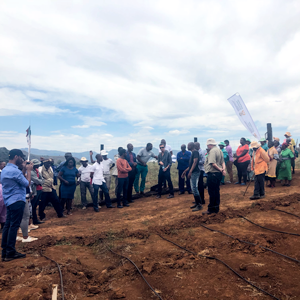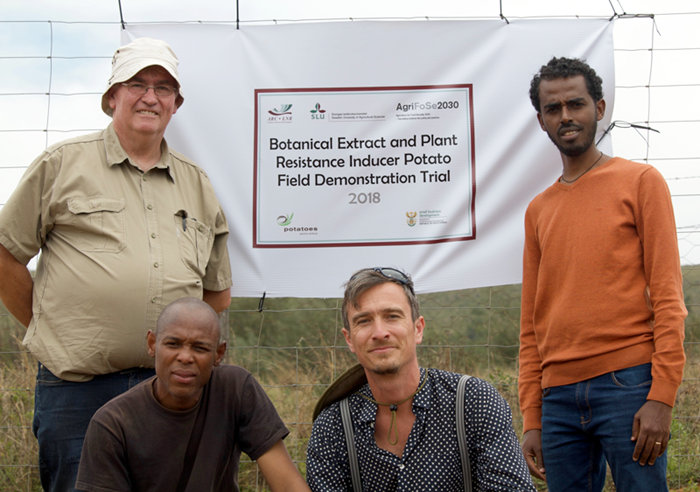From research to the field – field demonstrations in Ethiopia and South Africa

AgriFoSe2030 has financed field demonstrations in Ethiopia and South Africa as a way of convert research results into practice to growers and advisers and to policy makers. “I am very happy that we met here out in the field and not in the town hall. It is here where the work is”. These were the words of Mr DS Dlamini who is the ward councillor in Impendle district municipality at the South African inauguration of the field demonstration of disease-free potato.
These words captured the occasion very well and marked the start of the second field demonstration. Here under the shadow of the Drakensberg Mountains in KwaZulu-Natal, over 30 smallholder farmers, gathered along with researchers, local politicians and policy makers to share knowledge and see the impact of research in these rural communities. The first field demonstration was held with smallholder farmers in Holetta just outside of Addis Ababa in Ethiopia.
Boosting the plant's immune system
In Impendle, Kwazulu Natal, the Farmline co-operative together with the ARC are testing the potential of phosphite, which is plant resistance inducer meaning that it can boost the plant’s own immune systems, and botanicals, which are plant extracts that can combat plant disease. These can be effective against the major potato pathogen P. infestans causing late blight, a major source of yield losses all over the world.
Demonstrating scientific results
Demonstrations are a powerful way to demonstrate scientific results in practice. It is an opportunity for researchers to bring the tools and knowledge directly to extension service professionals and farmers.
– Also researchers can benefit hugely from the farmers’ observations and questions that are raised during the demonstrations, says Tewodros Mulugeta, researcher at Addis Ababa University.
Tewodros coordinated the first demonstration in Ethiopia. He was also present during the in Impendle as a part of an exchange to improve how field demos are conducted. From mid-December Tewodros is a faculty at the Metropolitan University in Addis Ababa.
Field days to convey scientific findings
The hope is that field demos can be a more direct understanding of research and can be obtained. So, in addition to the successful concept of farmers’ field schools, field demos and farmers’ field days can be a way to effectively convey scientific findings to farmers either directly or through participants working with policy or extension services.
The excitement and curiosity in Impendle was infectious and by bringing together respected local elders, including the local tribal chief, members of the local, provincial and national governments, to visit the farm itself, this research is sure to make a lasting impact.
It started with a research exchange
The research results are linked to a review article that has been financed by AgriFoSe2030 and to researcher Tewodros Mulugeta's visit to Sweden (Read about his visit here). ARC (Agricultural research council) in South Africa is responsible for the field trials that was used at the demonstrations as well as the planning and arrangement of the field days in South Africa. Addis Ababa University is responsible for the field trials and arranged the demonstrations in Ethiopia. The AgriFoSe2030 Theme 3 has been participating in the projects around Tewodros Mulugeta's exchange and the planning of the field trials.
